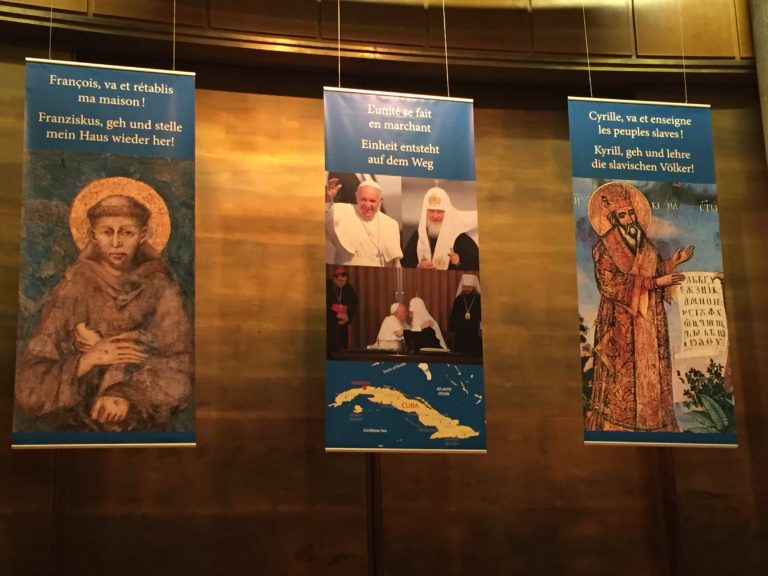
Fribourg University (Switzerland) was chosen by the Roman Catholic Church and the Russian Orthodox Church for the commemoration of the first anniversary of the first encounter between the Pope of Rome and the Patriarch of Moscow. Last year, Pope Francis and Patriarch Kirill met at “José Martí” International Airport in Havana (Cuba) on 12 February 2016 and signed a common declaration. This year, Cardinal Kurt Koch (President of Pontifical Council for Promoting Christian Unity) and Metropolitan Hilarion of Volokolamsk (Chairman of the Department for External Church Relations of the Orthodox Church of Russia) came to Fribourg (Switzerland) to reflect on the challenges and perspectives of that ecumenical meeting.
In his welcoming address, Metropolitan Jeremiah of Switzerland (Ecumenical Patriarchate, President of the Assembly of Orthodox Bishops of Switzerland) replaced the significance of that encounter in a broader context. “The Orthodox Church has decided on a common agreement to update the ecumenical dialogue, as the Third Preconciliar Panorthodox Conference of Chambésy in 1986 has demonstrated it. Indeed, the Ecumenical Patriarch has continually put into practice this decision and has contributed to the improvement and to the progress in the rapprochement of the two Christian worlds, the Orthodox Church of the East and the Roman Catholic Church of the West as well as other Christian Churches. (…) Today, Patriarch Kirill and all the Orthodox Church of Russian, through this historical encounter, underline the importance of the unity of Christians.”
In his speech, Metropolitan Hilarion of Volokolamsk mentioned four important challenges and perspectives that one can see from that encounter. First, the theological dialogue between the Roman Catholic and the Orthodox Churches. “I would like to note with satisfaction that the year of the Havana meeting was marked by the progress in the Orthodox-Catholic theological dialogue. After long preliminary discussions, in September of last year at the 14th plenary session of the Joint Commission for Theological Dialogue between the Roman Catholic Church and the Orthodox Church that took place in Chieti, Italy (…). I hope that in the nearest future we will be able to set about examining the key issue that is the object-matter of our division – the synodality and primacy in the Churches of the East and the West in the second millennium.” Secondly, “the tragedy of the genocide of Christians in the Middle East.” The Metropolitan stressed on that: “Over the past year, especially in view of the escalation of tensions around Aleppo and Mosul, the Supreme Authority of the Russian Orthodox Church at various meetings with leaders and representatives of the USA and Western European countries constantly raised the issue of the ongoing conflict in the Middle East and of the persecution of Christians in the region, emphasizing that combined efforts within one coalition were needed to oppose terrorism.” Thirdly, the conflict in Ukraine. Metropolitan Hilarion stated: “Hopefully, the message of the two Primates calling to exert every effort to stop bloodshed in Ukraine will also at last be heard by those involved in the conflict, and the lasting peace will be re-established in the country where the Orthodox and the Catholics live side by side. This appeal is becoming ever more urgent as the tension is growing in Eastern Ukraine where just recently the hostilities have resumed, causing casualties among civilians.” Finally, the family. The Metropolitan of Volokolamsk reminded that the Common Declaration calls to “fraternal cooperation in view of the challenges facing our Churches in Europe where under the pretence of promoting tolerance, democracy and liberal values, the Christianity and traditional moral values are being subjected to real persecution.”
In his communication, Cardinal Kurt Koch mentioned three critiques of the Common Declaration. “Some have regretted that, among the elements that unite us, the document does not mention explicitly the sacraments, in particular the one of baptism, the foundation of the relations between Christians.” Secondly, some consider that the document gives “a rather moralistic vision of ecumenism.” Finally, the critique of the Ukrainian Greek-Catholic Church concerning the passages of the document on Ukraine. On this point, he suggested the creation of an ad-hoc commission between the Ukrainian Greek-Catholic Church and the Russian Orthodox Church in order “to heal memories.” The President of Pontifical Council for Promoting Christian Unity also stressed three perspectives that come from the document. A first one, rather spiritual, is the possibility to engage in an “ecumenism of saints,” which enables among other things, the exchange of holy relics. A second one is the “cultural ecumenism,” which permits student exchanges and the organisation of exhibitions. Finally, a “practical ecumenism” between the Roman Catholic Church and the Russian Orthodox Church.
The commemoration was concluded by a concert of chants from the Latin and Russian Church music tradition given by the choir In illo tempore under the conduction of Alexandre Traube.